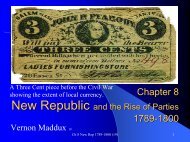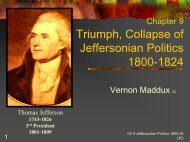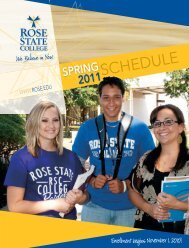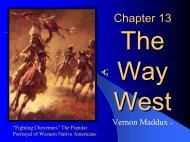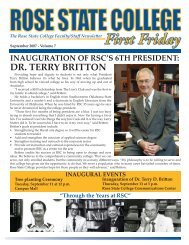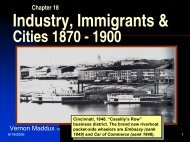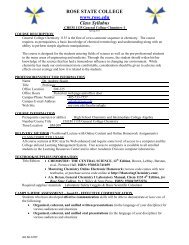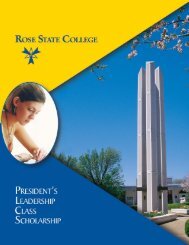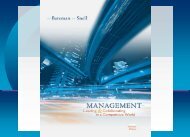Chap. 5 Imperial Breakdown 1763-1774
Chap. 5 Imperial Breakdown 1763-1774
Chap. 5 Imperial Breakdown 1763-1774
- No tags were found...
You also want an ePaper? Increase the reach of your titles
YUMPU automatically turns print PDFs into web optimized ePapers that Google loves.
<strong>Imperial</strong> <strong>Breakdown</strong><strong>1763</strong> - <strong>1774</strong><strong>Chap</strong>ter 5Vernon Maddux 24The British Union Jack at the time of the Revolution1Ch 5 Impl <strong>Breakdown</strong> <strong>1763</strong>-74(24)
King George II of Great BritainNominally Ruled the British Empire from 1727-17602• George II Augustus, house ofHanover was the last king to leadBritish armies into battle butexercised little political authorityduring his reign.• 1721-42. The British governmentwas firmly directed by the first socalled"Prime Minister," RobertWalpole.• Walpole was followed by a series ofweak ministers through 1781.• 1760, Oct 25. George II died andhis ambitious teenage grandson,George III, was crowned king ofIreland and Great Britain andEmperor of the British Empire.King George II 1683-1760Ch 5 Impl <strong>Breakdown</strong> <strong>1763</strong>-74(24)
Virginia’s HomeRule Threatened3Robert Dinwiddie(1693-1770)Lt-Gov. of Virginia1751-1758July 4, 1751 Lt Gov Dinwiddietook office at Williamsburg.1753. The 50-year harmoniousrelationship between RoyalGovernors and the House ofBurgesses is broken byDinwiddie who spurned colonialpolitics and insisted on hisabsolute royal prerogative.• Dinwiddie instituted a fee of onepistole (17 shillings) for every landpatent filed. This gave him wealthenough to avoid the usual bribery.• When the HOB protested that hehad imposed an unlawful tax thatendangered colonial liberty,Dinwiddie “permanently”dissolved the assembly.Ch 5 Impl <strong>Breakdown</strong> <strong>1763</strong>-74(24)
4Peace of Paris, Feb 10 <strong>1763</strong> France, Great Britain and SpainThe <strong>1763</strong> Treaty ended the French & Indian WarFrance agreed to give up all claims to North America.The Grand Union American Flagcarried by colonial militias duringthe French and Indian War.From Parliament’s viewpoint, there were 26 Americancolonies, including Canada, Bermuda, and several in theCaribbean. It also had to manage India, the Falklands soonAustralia and dozens of small colonies scattered around theworld.• <strong>1763</strong> marked the first time ina half century that GreatBritain was not engaged inwar.• King George III turned his fullattention from war tocontrolling and regulating hisvast British Empire.• To help him better run theempire, George III searchedfor a PM that could bringdiscipline to the valuable butmost unruly 13 NorthAmerican colonies.Ch 5 Impl <strong>Breakdown</strong> <strong>1763</strong>-74(24)
<strong>1763</strong> <strong>Imperial</strong> ReorganizationKing George III1738-1820• 1760. Crowned at age 19,George III dreamed of creating aworldwide British Empire under hispersonal direction.• <strong>1763</strong>. The French defeat iscelebrated around the Englishspeakingworld as a great Britishvictory over North America.• Wm Pitt, who won the war, retired.• Unfortunately, the war left GreatBritain its greatest debt in history.• Parliament looked to the colonies torelieve the tax burden from itssubjects within the British Isles.5Ch 5 Impl <strong>Breakdown</strong> <strong>1763</strong>-74(24)
Writs of AssistanceIntroduced in 1761John Stuart, Earl of ButePrime Minister <strong>1763</strong>Very unpopular, he quit after only afew months.Angry at Americanmerchants who violated theNavigation Acts by trading with theSpanish in the West Indies andeven traded with the French duringthe war, Parliament created a newpower to make it easier for customagents to prosecute the NewEngland sugar and rum smugglers.• A Writ of Assistance is createdas a general search warrant to beused only in America. It permitscustoms officials to search anyship or building without givingcause or asking for a judge’spermission.• English legal experts proclaimedthe Writs were unconstitutional andurged Americans to fight them.6Ch 5 Impl <strong>Breakdown</strong> <strong>1763</strong>-74(24)
The Proclamation of <strong>1763</strong>7George Grenville Prime Minister<strong>1763</strong>-1765 After 2 years of folly, heresigned under intense pressure.• <strong>1763</strong>, April 3. George III namedGeorge Grenville to replace theEarl of Bute as Prime Minister.• To ease tensions with NativeAmericans, Grenville issued aproclamation prohibitingsettlement by American colonistswest of the AppalachianMountains.• Americans deeply resented thisfiat, primarily because they werenot consulted.• Most American landspeculators simply ignored theproclamation-GeorgeWashington for one clamed50,000 acres in the Ohio Valleyas his veteran’s benefit.Ch 5 Impl <strong>Breakdown</strong> <strong>1763</strong>-74(24)
Sugar and Stamp Acts a stunning slap inthe face to celebrating American colonists8Samuel Adams 1722-1803Signer of the Declaration ofIndependence• 1764. To reduce the costs ofproviding an American defense,Grenville’s Parliament passed TheSugar Act which actually reducedthe tax on sugar and molassesbut increased its enforcement.• 1765. The Stamp Act passes.• In Boston, lawyer Sam Adams,cousin to John, organized “TheSons of Liberty” in protest of thetwo new taxes.• 1765. Aug. At this most criticaltime, the king dismissed PMGrenville creating great confusionin Parliament.Ch 5 Impl <strong>Breakdown</strong> <strong>1763</strong>-74(24)
9Confusion inParliamentWilliam Pitt the Elder PrimeMinister 1757-61 Under Pitt, theBritish national debt climbedfrom 72 million pounds before thewar to 132 millionIn the critical 12 years from <strong>1763</strong>to 1775, seven prime ministersdirected a confused Parliamentdenying it coherent leadership.• 1762 26 May–16 Apr <strong>1763</strong> JohnStuart, Earl of Bute• <strong>1763</strong>-5. George Grenville• 1765-6. Charles Wentworth• 1766-67. Pitt’s exchequer, CharlesTownshend took charge and imposedharsh tax measures on the colonieswhich mostly failed but greatly raisedtensions then suddenly died 4 Sept1767 at the height of the crisis.• 1767-70. Augustus Henry Fitzroy,Duke of Grafton.• 1770-82. Frederick Lord North• North aggressively pushed Englandtoward a war against the“ungrateful” and “crybaby”Americans.Ch 5 Impl <strong>Breakdown</strong> <strong>1763</strong>-74(24)
Aftermath of the Stamp Act CrisisStamp & Sugar acts repealed 176610A 1770 a SoL poster announcingthe boycott of a Tory business.• A primary result of the Stamp Actcrisis was to reveal how wide wasthe gap between American colonialassemblies and British Parliament.• 1765. Boston. The Sons of Liberty(left) boycotted all English goods toprotest the Stamp Act.• 1766. Pressured by Englishmerchants, Charles Townshendsullenly repealed both the Stampand Sugar tax but issued a sternwarning to the Americansprotesters that Parliament hadevery right to tax them.• Tory Parliamentarians angrilyspoke out against the antics of theAmerican “crybabies.”Ch 5 Impl <strong>Breakdown</strong> <strong>1763</strong>-74(24)
Townshend’s Burden…the <strong>Imperial</strong> Debt Struggle11• 1765. Townshend, Chancellor ofExchequer (Treasury) grudgingly repealedthe Stamp & Sugar acts but insisted thatthe Americans had to pay a “fair share.”• 1767, Jan. Townshend ordered ten Britishregiments to be permanently stationed inNorth America at Boston and NYC “toguard NE colonies from Indian attack.”• To fund the army, various taxes wereimposed on Boston called the “TownshendDuties.”• In Boston, British officers took over thecommon green and forced ordinary peopleto billet soldiers for free in any unusedroom or house.• 1767, Sept. 10. Townshend died leaving aParliamentary mess.Charles Townshend1725-1767Exchequer 1765-1767Ch 5 Impl <strong>Breakdown</strong> <strong>1763</strong>-74(24)
1770. King George searches for a newPrime Minister at this Critical Time1767, Dec. To replaceTownshend, the King names LordNorth Chancellor of Exchequer.• 1770, Jan. 28. When the Duke ofGrafton resigned as PrimeMinister, North formed agovernment and became PM.• He served to March 27 1782,finally resigning after the Britishdefeat at Yorktown in Sept 1781.• North’s government dealt poorly12Frederick Lord North 1732-17922 nd Earl of GuilfordExchequer 1767-1770Prime Minister 1770-1782with the Americans and isultimately responsible for losingthe American Colonies.Ch 5 Impl <strong>Breakdown</strong> <strong>1763</strong>-74(24)
The 1770 British Army in Boston131770, Nine British regiments, abouthalf the 8, 580 British NorthAmerican army, were stationed inBoston, the rest in New York City.• When fighting Napoleon in1812, Lord Wellington calledhis hard fighting Britishsoldiers, “the lowest scum ofthe earth.” He said, “I do notknow if they scare the enemy,but by God- they scare me!”• 1770. Friction between Britishprivate soldiers and the youngpeople of Boston grew until itexploded into what SamAdams called, “The BostonMassacre.”Ch 5 Impl <strong>Breakdown</strong> <strong>1763</strong>-74(24)
Boston Massacre March 5 177014Five civilians, includingCrispus Attucks are shot todeath by the British regulars.• “One of the soldiershaving received asevere blow with astick, stepped a littleon one side andinstantly fired, onwhich turning to andasking him why hefired without orders, Iwas struck with a clubon my arm…”• Capt. Preston’s report.Ch 5 Impl <strong>Breakdown</strong> <strong>1763</strong>-74(24)
Williamsburg, Virginia 1769. Lord Dunmore’s fightwith the House of Burgess15The Governor’s Palace atWilliamsburg, Home to EarlDunmore 1769-75.The HOB protested theWrits of Assistance; the StampTax; and especially theannounced plan to transportcolonists accused of treasonback to England for trial.• Gov. John Murray, 4 th Earl ofDunmore, dissolved the 150year-old Virginia legislatureand forbids them to meet againwithout his permission.• The Burgesses immediatelygathered in a local tavern downthe street and plan theirresistance to Dunmore and hispolicies.Ch 5 Impl <strong>Breakdown</strong> <strong>1763</strong>-74(24)
1770. Economic Depression in VirginiaThe effect of 150 years ofplanting tobacco is a lossof fertile soil.• The year following the dismissal of theHOB is marked by widespread agriculturaldecline and economic depression fromdepleted soil and drought.• The population of Virginia was relativelyvery large while the soil of the Tidewaterand Piedmont plantations were worked-outand both food and tobacco crop failuresuniversal.• All Virginia counties suffered moderate toextreme topsoil erosion.• All old landed Virginia families sufferedgreat economic distress which becameacute during the war (Bound, 202).16Ch 5 Impl <strong>Breakdown</strong> <strong>1763</strong>-74(24)
The Boston Tea Party Dec. 16, 1773Thomas HutchinsonAmerican-born Lt.Gov. ofMassachusetts.17• 1770-73 The “Quiet Period” ofBritish relations following theBoston Massacre ends.• 1773 Summer. Lord North’snew Tea Act angers colonialsmoststop drinking tea.• Lt Gov. Thomas Hutchinson, ahated acting royal governor ofMassachusetts, appoints two ofhis sons as tea agents.• 1773, Dec 16. A group of“Indians” take over 3 Britishships and toss 342 chests oftea into Boston Harbor.Ch 5 Impl <strong>Breakdown</strong> <strong>1763</strong>-74(24)
Coercive ActsJune 1, <strong>1774</strong>• <strong>1774</strong>. Annapolis, Maryland,residents inspired by theBoston Tea Party, burn aBritish tea ship, then capture,tar & feather two tax men.• Alarmed at the spreadingresistance, Lord North getsParliament to pass a series ofrepressive measures aimeddirectly at Boston. He callsthem the “Coercive Acts.”• In Boston the laws are called“Intolerable acts”18Colonials Tar & Feather aBritish Tax CollectorCh 5 Impl <strong>Breakdown</strong> <strong>1763</strong>-74(24)
“Intolerable” Acts June 1, <strong>1774</strong>Maj Gen Thomas Gage, head of the British Army in North America, isnamed governor of all New England colonies to suppress the rebels.191770. Sons of Liberty issuestern warning to Tories.• Boston Port Act: Boston Harbor isclosed until destroyed tea is repaid.• Administration of Justice Act: Britishofficials are given immunity frommurder charges.• Massachusetts Government Act:modifies 1691 charter; abolishes allelected officials: including sheriffs andadministrators. Town meetings arelimited to once a year under directroyal supervision.• Quartering Act: soldiers may take overany uninhabited building or room inBoston.Ch 5 Impl <strong>Breakdown</strong> <strong>1763</strong>-74(24)
In Virginia. Royal Governor John Murray, dissolvesthe House of Burgesses, … again.Raleigh Tavern est. 1717Williamsburg, VirginiaActed as informal HOB in<strong>1774</strong>.• <strong>1774</strong>. Dismissed from the HOB,the 89 burgess go to RaleighTavern and discuss how toactively resist the British royalgovernment.• The HOB calls for a boycott onall British imports and issue acall for other colonies to meetthat summer in a “ContinentalCongress” at Philadelphia.• 1775 June. Demanding LordDunmore pay for the gunpowderhe removed to a warship, theVirginia militia made threats onhis life and he fled to the ship.20Ch 5 Impl <strong>Breakdown</strong> <strong>1763</strong>-74(24)
First Continental CongressOctober 26, <strong>1774</strong>Independence Hall, Philadelphia• The Representatives of allcolonies, except Georgia, met inAssembly Hall, soon to be knownas Independence Hall.• Peyton Randolph of Virginia waselected president.• The Delegates decide that their“Continental Association ofColonies” should institutevarious sanctions against theBritish.• All imports from England are tobe cut off by Dec 1, <strong>1774</strong>. If notsufficient, all British Empireimports cut off by Sept 1775.• Independence is not mentioned.21Ch 5 Impl <strong>Breakdown</strong> <strong>1763</strong>-74(24)
The “Continental Association of Colonies” adjournsafter deciding how to resist the British economically22Ben Franklin1706-1790• Not even Sam Adams argued forindependence.• Ben Franklin, Paul Revere andJohn Hancock joined Sam Adamsin creating new armed chapters of“Sons of Liberty” for every colony.• The “SoL” are charged with ofprotecting Patriot activists fromBritish reprisals.• The SoL armed chapters becomethe direct predecessors of theContinental Army.Ch 5 Impl <strong>Breakdown</strong> <strong>1763</strong>-74(24)
1775. Lord North gets tough.23• All Americans closely followed theevents happening in Boston andVirginia through local Committeesof Correspondence which publishnewspaper-like bulletins in eachtown.• As tension grows, Americanfarmers in every colony clean theirmuskets and gather at theircourthouse on weekends to trainwith fellow “Minutemen.”• They become fiercely determinedto fight the Redcoats.Ch 5 Impl <strong>Breakdown</strong> <strong>1763</strong>-74(24)
Patriot vs. LoyalistWhig versus Tory evolves into Patriot versus TraitorDrawn by Ben Franklin, this was thefirst flag of the ContinentalAssociation of Colonies• <strong>1774</strong>, Dec. As tension grows,the residents of the Americancolonies divide into threefairly equal parts.• 1. Not-involved.• 2. Loyal to the Crown.• 3. Fully determined to retainself-rule; willing to sacrificeeverything for victory.• The people in the firstcategory waffled back andforth with the tides of fortune.24Ch 5 Impl <strong>Breakdown</strong> <strong>1763</strong>-74(24)





